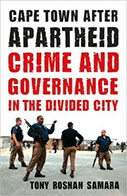Cape Town After Apartheid: Crime And Governance
In The Divided City

Author: Tony Roshan Samara
Publisher: Minneapolis, MN: University of Minnesota Press, 2011. 272p.
Reviewer: Gail Super | May 2013
This book is a must read for anyone who is interested in the governance of crime in South Africa and also for those who work in the field of neoliberalism and its impact on urban governance. Like Wacquant (2001a, 2001b, 2007), Samara argues that crime control plays a central role in the discourse and practice of neoliberal governance. This is because neoliberalism adopts a narrow conception of development, presenting threats to security as the main impediment to urban prosperity (p. 5). With its tourist economy, Cape Town exemplifies a broader trend of presenting crime as the central challenge to development.
Samara presents Cape Town as consisting of ‘two cities’: the ‘well-connected global brand that attracts tourists and investments from all corners of the globe’ and ‘an underdeveloped urban periphery’ that has much in common with the ‘ghettos of the global South’ (p.3). Development, in the guise of urban renewal, divides the city. The outlying slums are governed by punitive processes whereas the elite urban enclaves are governed through privatized security assemblages, in which the state plays a facilitative role. This binary governance is productive insofar as differential policing practices reproduce the differences between the urban centre and its periphery. There is a ‘governing through crime’ insofar as crime shapes the discourses of all other governance fields.
Samara argues that not only have apartheid era divisions been reproduced in democratic South Africa but also that neoliberalism has resulted in a new ‘iteration of apartness’ (p. 3). In fact the neoliberal governance of crime is an iteration of the age-old theme of the ‘control of dangerous young men’ (p.19). The book contains many fascinating statistics such as how figures about police criminality in the Western Cape constitute a disproportionate percentage of the national total and how the criminal justice budget increased from R14 billion in 1995 to R71 billion in 2009. At the same time as there was a macro shift from apartheid to neoliberalism, Cape Town’s local government imported zero tolerance urban renewal strategies from the US. This entailed clearing the inner city of the crime and grime exemplified by the ‘black urban underclass’ (p. 71). As the ‘political economy of urban renewal’ (p. 87) combined with a moral panic about racial change it further embedded ‘notions of race and criminality’. The effect was the production of ‘new mechanisms of social control’ that re-enclosed ‘affluent urban space through the use of coercive cordons’ (p. 87).
The policing of crime and gangsterism in the townships contributes to the creation of multiple insecurities for residents, thereby militating against the development agenda that it is meant to be supporting (p. 153). For youth especially there is a striking resemblance/continuity between the underdevelopment of apartheid and the underdevelopment of neoliberalism (p. 152). The state is absent insofar as service delivery is concerned, but present in the sense of being harsh on criminals and gangsters. By criminalizing service delivery protests the state obfuscates the real issue which is the ‘fundamental conflict between the city’s neoliberal agenda, security and the demands of communities for social development’ (p. 154). Criminalizing protests (mostly about the lack of services) and deploying police is at the heart of a neoliberal governance strategy for the townships where the state polices for cost recovery but is absent in the sphere of service provision.
Samara argues that as the ANC abandoned the social welfare Reconstruction and Development Programme (RDP) in 1996 in favour of the neoliberal Growth Employment and Redistribution Programme (GEAR), so too did the government declare a war on crime. Following a standard left wing argument (Gordon (1998,2001,2006), Bond (2000), Wacquant (2001a, 2001b, 2007)) he presents a punitive response to crime as being symptomatic of, and central to, neoliberalism, insofar as it constitutes a response by the state and ‘urban elites’ to the challenges of governing a divided city. Because the state has been unable to provide the promised development as a means to undermine crime it has instead resorted to a war on crime (p. 23). At the same time Samara also explicitly states that this war cannot be explained solely in terms of neoliberalism and it is here that his argument becomes nuanced and interesting. The punitive response to crime – an ‘outcome of a particular configuration of the relationship between development and security’ – has ‘deep historical roots in the apartheid and colonial eras’ which have been reinvigorated ‘in the uncertain and unstable postapartheid present’ (p. 7). He argues that we are witnessing a ‘relatively seamless’ although contested, transition from apartheid to neoliberalism (p.7). He does not see neoliberalism as having started under apartheid but instead presents, somewhat too neatly, a definite shift from apartheid to neoliberalism, when it fact it could also be argued that neoliberalism meshed rather well with apartheid, particularly insofar as the neoliberal reforms, that the apartheid government started to implement in the mid 1970s, were presented as a way to prevent South Africa from slipping into socialism.
Samara’s normative project in the book is a critique of neoliberalism and a call for a return to the social crime prevention discourse of an earlier era – to the ANC’s ‘original position’ that human security can only be attained through ‘political, social and economic empowerment’ (p. 23). Perhaps this is somewhat naïve and instead he might have presented the various discourses and ideologies on development and crime as being assembled in varying configurations, making it that much more complex and difficult to disentangle them. Social crime prevention and the implementation of restorative justice are presented as being diametrically opposed to the cordon style security associated with neoliberalism. Yet, there are overlaps and the more left leaning forms of crime prevention are as easily assimilated with neoliberal ideology and practices as they are with other governmental techniques. Samara states that: “social crime prevention targets the causal factors of crime through policies and practices determined by existing research rather than prevailing political winds or punitive moralities” (p. 138), but elides the fact that politics is as much present in social crime prevention as it is in punitive policies. In this sense I would have preferred a more critical approach to social crime prevention. He does however argue that although neoliberalism is the ‘overarching governance regime in Cape Town its expression varies – and in this regard he emphasizes its unevenness. All in all a very worthwhile read and a necessary addition to any syllabus on criminology in South Africa.
References
Gordon, D.1998. Crime in the new South Africa, The Nation, November 9.
Gordon, D. 2001. Side by side: neoliberalism and crime control in post-apartheid South Africa,28 (3) Social Justice 28, no.3: 141-188.
Gordon, D. 2006. Transformation and Trouble: Crime, Justice and Participation in Democratic South Africa, Ann Arbor: University of Michigan Press.
Bond, P. 2000. Elite Transition: from Apartheid to Neoliberalism in South Africa, London, Pluto Press.
Wacquant, L.2001a.Deadly symbiosis: When ghetto and prison meet and mesh, 3(1) Punishment and Society: 95-132.
Wacquant, L.2001b. The penalisation of poverty and the rise of neoliberalism, 9(4) European Journal on Criminal Policy and Research, special issue on Criminal Justice and Social Policy.
Wacquant, L. 2007. Urban Outcasts, A Comparative Sociology of Advanced Marginality, US: Polity.
Wacquant, L. 2009. Punishing the Poor: The Neoliberal Government of Social Insecurity, North Carolina: Duke University Press.
Gail Super (gjs220@nyu.edu), Centre for Criminology, University of Cape Town, South Africa


